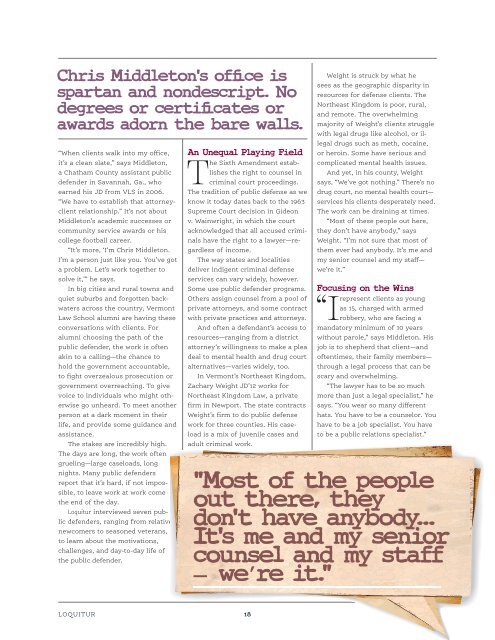In search of justice
fall2016_web
fall2016_web
Create successful ePaper yourself
Turn your PDF publications into a flip-book with our unique Google optimized e-Paper software.
Chris Middleton's <strong>of</strong>fice is<br />
spartan and nondescript. No<br />
degrees or certificates or<br />
awards adorn the bare walls.<br />
“When clients walk into my <strong>of</strong>fice,<br />
it’s a clean slate,” says Middleton,<br />
a Chatham County assistant public<br />
defender in Savannah, Ga., who<br />
earned his JD from VLS in 2006.<br />
“We have to establish that attorneyclient<br />
relationship.” It’s not about<br />
Middleton’s academic successes or<br />
community service awards or his<br />
college football career.<br />
“It’s more, ‘I’m Chris Middleton.<br />
I’m a person just like you. You’ve got<br />
a problem. Let’s work together to<br />
solve it,’” he says.<br />
<strong>In</strong> big cities and rural towns and<br />
quiet suburbs and forgotten backwaters<br />
across the country, Vermont<br />
Law School alumni are having these<br />
conversations with clients. For<br />
alumni choosing the path <strong>of</strong> the<br />
public defender, the work is <strong>of</strong>ten<br />
akin to a calling—the chance to<br />
hold the government accountable,<br />
to fight overzealous prosecution or<br />
government overreaching. To give<br />
voice to individuals who might otherwise<br />
go unheard. To meet another<br />
person at a dark moment in their<br />
life, and provide some guidance and<br />
assistance.<br />
The stakes are incredibly high.<br />
The days are long, the work <strong>of</strong>ten<br />
grueling—large caseloads, long<br />
nights. Many public defenders<br />
report that it’s hard, if not impossible,<br />
to leave work at work come<br />
the end <strong>of</strong> the day.<br />
Loquitur interviewed seven public<br />
defenders, ranging from relative<br />
newcomers to seasoned veterans,<br />
to learn about the motivations,<br />
challenges, and day-to-day life <strong>of</strong><br />
the public defender.<br />
An Unequal Playing Field<br />
The Sixth Amendment establishes<br />
the right to counsel in<br />
criminal court proceedings.<br />
The tradition <strong>of</strong> public defense as we<br />
know it today dates back to the 1963<br />
Supreme Court decision in Gideon<br />
v. Wainwright, in which the court<br />
acknowledged that all accused criminals<br />
have the right to a lawyer—regardless<br />
<strong>of</strong> income.<br />
The way states and localities<br />
deliver indigent criminal defense<br />
services can vary widely, however.<br />
Some use public defender programs.<br />
Others assign counsel from a pool <strong>of</strong><br />
private attorneys, and some contract<br />
with private practices and attorneys.<br />
And <strong>of</strong>ten a defendant’s access to<br />
resources—ranging from a district<br />
attorney’s willingness to make a plea<br />
deal to mental health and drug court<br />
alternatives—varies widely, too.<br />
<strong>In</strong> Vermont’s Northeast Kingdom,<br />
Zachary Weight JD’12 works for<br />
Northeast Kingdom Law, a private<br />
firm in Newport. The state contracts<br />
Weight’s firm to do public defense<br />
work for three counties. His caseload<br />
is a mix <strong>of</strong> juvenile cases and<br />
adult criminal work.<br />
Weight is struck by what he<br />
sees as the geographic disparity in<br />
resources for defense clients. The<br />
Northeast Kingdom is poor, rural,<br />
and remote. The overwhelming<br />
majority <strong>of</strong> Weight’s clients struggle<br />
with legal drugs like alcohol, or illegal<br />
drugs such as meth, cocaine,<br />
or heroin. Some have serious and<br />
complicated mental health issues.<br />
And yet, in his county, Weight<br />
says, “We’ve got nothing.” There’s no<br />
drug court, no mental health court—<br />
services his clients desperately need.<br />
The work can be draining at times.<br />
“Most <strong>of</strong> these people out here,<br />
they don’t have anybody,” says<br />
Weight. “I’m not sure that most <strong>of</strong><br />
them ever had anybody. It’s me and<br />
my senior counsel and my staff—<br />
we’re it.”<br />
Focusing on the Wins<br />
clients as young<br />
as 15, charged with armed<br />
“Irepresent<br />
robbery, who are facing a<br />
mandatory minimum <strong>of</strong> 10 years<br />
without parole,” says Middleton. His<br />
job is to shepherd that client—and<br />
<strong>of</strong>tentimes, their family members—<br />
through a legal process that can be<br />
scary and overwhelming.<br />
“The lawyer has to be so much<br />
more than just a legal specialist,” he<br />
says. “You wear so many different<br />
hats. You have to be a counselor. You<br />
have to be a job specialist. You have<br />
to be a public relations specialist.”<br />
"Most <strong>of</strong> the people<br />
out there, they<br />
don't have anybody...<br />
It's me and my senior<br />
counsel and my staff<br />
— we’re it."<br />
LOQUITUR 18


